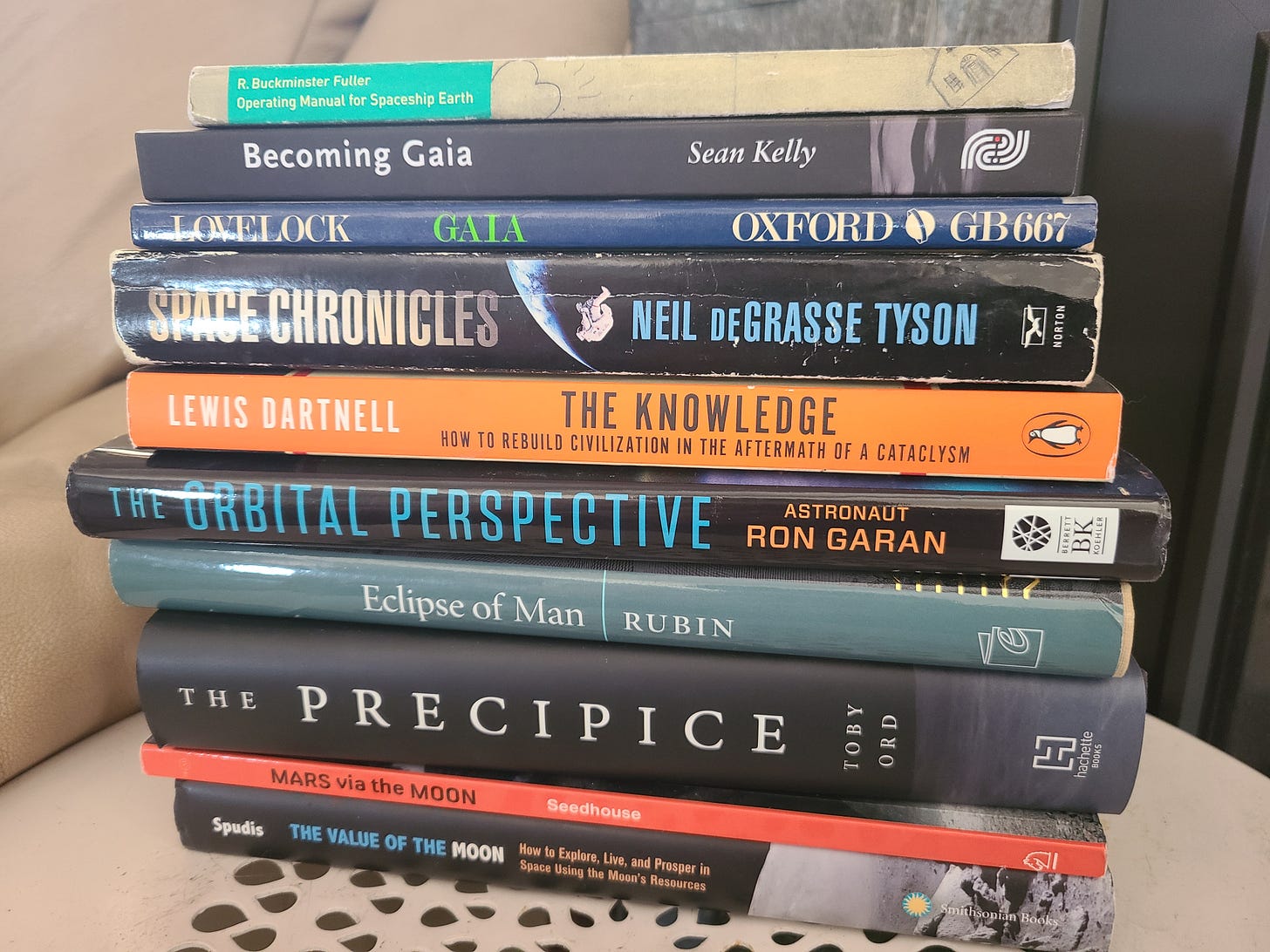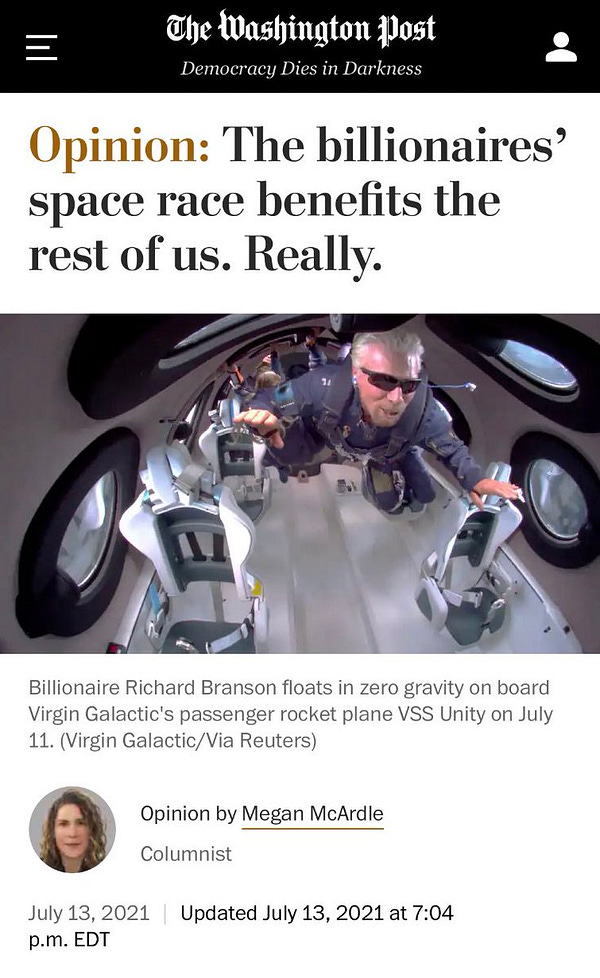The Overview - July 26, 2021
The Overview is a weekly roundup of eclectic content in-between essay newsletters & 'Conversations' podcast episodes to scratch your brain's curiosity itch.
Hello Eclectic Spacewalkers,
I wish that you and your family are safe and healthy wherever you are in the world. :)
Check out the last The Overview - July 12, 2021: HERE
Read our latest essay - Technopoly: HERE
Watch/listen to our ‘Conversation with Jeremy Johnson ’: HERE
Get our E-Book for free by using ‘substack’: HERE
—
Below are some eclectic links for the week of July 26, 2021
Enjoy, share, and subscribe!
Table of Contents
Theme & Topics: Human Spaceflight & Exploration, Extreme Inequality, Billionaire Space Race, Jeff Bezos, Blue Origin, and the Washington Post, Space Junk, Perceptions on Redistribution, Socio-Economic conditions & energy use
Articles/Essays - The New Atlantis Journal; Vice; The Atlantic; Tribune Mag; Jacobin; The Drift Mag; The Guardian; Nautilus Magazine; Professor Galloway & 8 ADDITIONAL RELATED MATERIALS
Books -Space Chronicles: Facing the Ultimate Frontier by @neiltyson & 12 ADDITIONAL RELATED MATERIALS
Documentaries - The New Space Race of the 2020s (#Documentary) via @ColdFusion_TV; I Need More Space: Russian Cosmonaut Fyodor Yurchikhin’s long road to the stars; The rich, the poor and the trash | DW Documentary (Inequality documentary)
Lectures - Is It Our Moral Duty to Explore Other Planets? - with @mason_lab in @Ri_Science; Mars Exploration: Curiosity and Beyond - with @Doctor_Astro in @Ri_Science; Space Chronicles
Paper - The Impact of Diversity on Distributive Perceptions and Preferences for Redistribution; Socio-economic conditions for satisfying human needs at low energy use: An international analysis of social provisioning; Global patterns of ecologically unequal exchange: Implications for sustainability in the 21st century
Podcasts - Demystifying the Billionaire Space Race via @parismarx in @techwontsaveus; Solidarity is Contagious (ft. @astradisastra) via @machinekillspod
TED Talks - The epic of Gilgamesh, the king who tried to conquer death - Soraya Field Fiorio - @TEDtalks; Small rockets are the next space revolution | Peter Beck of @RocketLab
Twittersphere -12 tweets from all across the spectrum on the ‘space race’
Videos (Short) - The (Slow) Crisis Of Space Junk via @PBSspacetime; How To Terraform Venus (Quickly) via @Kurz_Gesagt; The Physics of Space War via @AerospaceCorp; How the rich avoid paying taxes via @Maddie_Marshall @voxdotcom; #1 - The Overview Effect YT Playlist:
Website - How Long Does It Take Tech CEOs to Earn Your Salary?; Pandemic Pay Plunder via @IPS_DC; NASA Spin-Off Technologies via @NASAspinoff
Articles/Essays
The Conquest of Space and the Stature of Man via Hannah Arendt in @TNAJournal
Has man’s conquest of space increased or diminished his stature?”
The question raised is addressed to the layman, not the scientist, and it is inspired by the humanist’s concern with man, as distinguished from the physicist’s concern with the reality of the physical world. To understand physical reality seems to demand not only the renunciation of an anthropocentric or geocentric world view, but also a radical elimination of all anthropomorphic elements and principles, as they arise either from the world given to the five human senses or from the categories inherent in the human mind. The question assumes that man is the highest being we know of, an assumption which we have inherited from the Romans, whose humanitas was so alien to the Greeks’ frame of mind that they had not even a word for it. (The reason for the absence of the word humanitas from Greek language and thought was that the Greeks, in contrast to the Romans, never thought that man is the highest being there is. Aristotle calls this belief atopos, “absurd.”)[2] This view of man is even more alien to the scientist, to whom man is no more than a special case of organic life and to whom man’s habitat — the earth, together with earthbound laws — is no more than a special borderline case of absolute, universal laws, that is, laws that rule the immensity of the universe. Surely the scientist cannot permit himself to ask: What consequences will the result of my investigations have for the stature (or, for that matter, for the future) of man? It has been the glory of modern science that it has been able to emancipate itself completely from all such anthropocentric, that is, truly humanistic, concerns.
The question propounded here, insofar as it is addressed to the layman, must be answered in terms of common sense and in everyday language (if it can be answered at all). The answer is not likely to convince the scientist, because he has been forced, under the compulsion of facts and experiments, to renounce sense perception and hence common sense, by which we coordinate the perception of our five senses into the total awareness of reality. He has also been forced to renounce normal language, which even in its most sophisticated conceptual refinements remains inextricably bound to the world of the senses and to our common sense. For the scientist, man is no more than an observer of the universe in its manifold manifestations. The progress of modern science has demonstrated very forcefully to what an extent this observed universe, the infinitely small no less than the infinitely large, escapes not only the coarseness of human sense perception but even the enormously ingenious instruments that have been built for its refinement. The data with which modern physical research is concerned turn up like “mysterious messenger[s] from the real world.”[3] They are not phenomena, appearances, strictly speaking, for we meet them nowhere, neither in our everyday world nor in the laboratory; we know of their presence only because they affect our measuring instruments in certain ways. And this effect, in the telling image of Eddington, may “have as much resemblance” to what they are “as a telephone number has to a subscriber.”[4] The point of the matter is that Eddington, without the slightest hesitation, assumes that these physical data emerge from a “real world,” more real by implication than the world we live in; the trouble is that something physical is present but never appears.
The goal of modern science, which eventually and quite literally has led us to the moon, is no longer “to augment and order” human experiences (as Niels Bohr,[5] still tied to a vocabulary that his own work has helped to make obsolete, described it); it is much rather to discover what lies behind natural phenomena as they reveal themselves to the senses and the mind of man. Had the scientist reflected upon the nature of the human sensory and mental apparatus, had he raised questions such as What is the nature of man and what should be his stature? What is the goal of science and why does man pursue knowledge? or even What is life and what distinguishes human from animal life?, he would never have arrived where modern science stands today. The answers to these questions would have acted as definitions and hence as limitations of his efforts. In the words of Niels Bohr, “Only by renouncing an explanation of life in the ordinary sense do we gain a possibility of taking into account its characteristics.”[6]…
At this moment, the prospects for such an entirely beneficial development and solution of the present predicaments of modern science and technology do not look particularly good. We have come to our present capacity to “conquer space” through our new ability to handle nature from a point in the universe outside the earth. For this is what we actually do when we release energy processes that ordinarily go on only in the sun, or attempt to initiate in a test tube the processes of cosmic evolution, or build machines for the production and control of energies unknown in the household of earthly nature. Without as yet actually occupying the point where Archimedes had wished to stand, we have found a way to act on the earth as though we disposed of terrestrial nature from outside, from the point of Einstein’s “observer freely poised in space.” If we look down from this point upon what is going on on earth and upon the various activities of men, that is, if we apply the Archimedean point to ourselves, then these activities will indeed appear to ourselves as no more than “overt behavior,” which we can study with the same methods we use to study the behavior of rats. Seen from a sufficient distance, the cars in which we travel and which we know we built ourselves will look as though they were, as Heisenberg once put it, “as inescapable a part of ourselves as the snail’s shell is to its occupant.” All our pride in what we can do will disappear into some kind of mutation of the human race; the whole of technology, seen from this point, in fact no longer appears “as the result of a conscious human effort to extend man’s material powers, but rather as a large-scale biological process.”[27] Under these circumstances, speech and everyday language would indeed be no longer a meaningful utterance that transcends behavior even if it only expresses it, and it would much better be replaced by the extreme and in itself meaningless formalism of mathematical signs.
The conquest of space and the science that made it possible have come perilously close to this point. If they ever should reach it in earnest, the stature of man would not simply be lowered by all standards we know of, but have been destroyed.”
—
The Billionaire 'Space Race' Has Nothing to Do With Space via @bigblackjacobin in @VICE
“Billionaires funding suborbital flights aren't building a future for humanity off Earth, so much as seeking capital to build a private space tourism industry that will profit off of Earth.
“Much of the criticism around these plans has centered around the fact that this is time and money that could be spent developing and building much more feasible infrastructure to do literally anything else here on Earth. Since 2000, over $7 billion in public subsidies have been doled out to private space
companies through contracts with NASA, the Pentagon, and the FCC. In 2019, private space companies received nearly $6 billion in private investments...
Space travel, we are often told, is about inspiring generations to pursue careers in science or technology that push humanity forward in its inexorable march into the future. The current reality, however, is that it’s main purpose is to bolster private profit and international stature—both of which detract and distract from public and domestic problems like hunger, homelessness, and the risk of ecological catastrophe.
To this day, the 1969 Moon landing is spoken about with zealous fervor Less than a year after Armstrong’s first steps came Gil Scott-Heron’s spoken word poem "Whitey on the Moon" (1970), wherein Scott-Heron narrates his sister getting bit by a rat, the medical debt incurred afterwards, the rising cost of living, and their general immiseration at the same time as tens of billions of dollars are spent on ensuring Armstrong walked on the Moon. The questions that ring through the poem and should ring through any discussion of Branson, Musk, Bezos, and other barons going into space are: precisely who is going to space, why, and at what cost?
“We” did not go to the Moon during the Cold War, similar to how “we” are not going to space because Branson and Bezos and Musk want to. They are not going to space as most imagine it, but to low earth orbit.
They are not building a future for humanity off of Earth, but instead seeking investors and government subsidies for a private space tourism industry that will profit off of Earth.””
—
NEW MEXICO’S SAD BET ON SPACE EXPLORATION via @lifewinning in @TheAtlantic
“Money is another reason Spaceport America finds itself here. In 2006, then–New Mexico Governor Bill Richardson struck a partnership with Richard Branson’s Virgin Galactic to build the company’s headquarters in New Mexico. The state paid for the $220 million in construction costs with public funds, some of which came directly from neighboring Doña Ana and Sierra counties via gross-receipts-tax increases. Those taxes are expected to deliver nearly $75 million by 2029. In exchange, the locals long for economic opportunity. They could use it; according to U.S. Census data, Sierra County has one of the lowest median household incomes of the 33 counties in the state of New Mexico…
But when it’s not inviting the public to take in a spectacle, the space industry treats most of its activities as closely guarded trade secrets—so much so that the spaceport’s public financing and ownership has been deemed a major liability. This was the reason that the New Mexico legislature voted overwhelmingly in favor of a bill that gives the spaceport significant exemptions from public-records requests. The Spaceport America CEO, Dan Hicks, argued that companies that might have come to New Mexico were choosing competitor sites out of fear that competitors could glean information about their R&D through records requests. The legislature agreed; during the same session, it also allocated $10 million to Spaceport America for a new hangar and additional operations…
This is perhaps the most unavoidable and disconcerting truth of Spaceport America. The romance and promise of the American West was built, in part, on federal land grants to private corporations that promised to bring boomtowns to places previously otherwise deemed uninhabitable wastelands. Cities rose and fell with the rerouting of railroads; a major turning point in Las Cruces’ own history came when the city sold right-of-way to the Atchison, Topeka, and Santa Fe Railway in the 1880s, making the city part of a crucial industrial thoroughfare…
To manifest destiny’s proponents, to doubt the inevitability of technological and social progress via the railroad was tantamount to doubting the will of God. Today, questioning the value of (mostly) privately funded space development likewise feels like doubting human progress. Spaceport America isn’t all that different from the railroad and mining executives building company towns that it cites in its own promotional literature—which is to say, it uses the promise of progress as a smoke screen from very real concerns over taxpayer funding and public accountability. The romance of space distracts from the reality that at the end of the day, Spaceport America is a publicly financed resource mainly serving private companies, built on a long-stalled promise of bringing new money and a daring new tech industry to a jobs-hungry and very poor region. The price tag and PR rhetoric may differ from that of cities engaged in bidding wars over a Facebook data center or a new corporate tech campus, but concerns over public concessions to private-industry demands for secrecy and tax breaks (along with questions of whether the project’s benefits will actually be felt by residents who need them the most) remain more or less the same.”
The new right stuff: Social imaginaries of outer space and the capitalist accumulation of the cosmos
“Abstract: This thesis utilizes ethnographic and historical data in order to propose that the trajectory of outer space imaginaries—and therefore, as will be demonstrated, the future realities of outer space affairs—has drifted from peaceful exploration to violent exploitation due to the rise of private space corporations (operating under the moniker of NewSpace). This is partially due to the increasing acceptance of neoliberal capitalism within the United States—and much of the Global North—since the 1970s. Furthermore, NewSpace companies—which now possess multi-billion dollar contracts with governmental space agencies—are zealous adopters of neoliberal economics, and these philosophies are tied to colonial conceptions of the individual, limited governance, unchecked resource extraction, and frontier mentalities. These concepts became apparent during my multi-sited ethnographic investigations of NewSpace—as well as governmental—facilities and museums. This thesis argues that these hegemonic economic ontologies must be met with resistance from social scientists, science fiction authors, and the public in order to create a human future in outer space that is equitable, decolonized, and democratic.”
Today I learned that @virgingalactic's spaceport in New Mexico was built with public money, via this 2018 article by @lifewinning

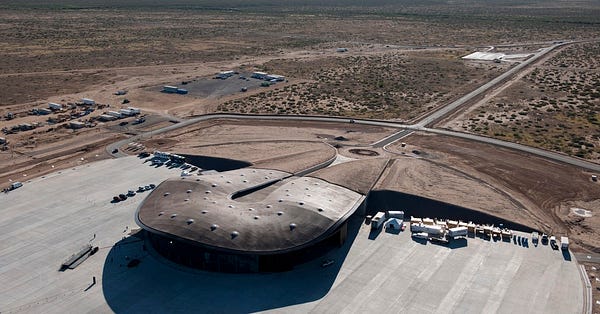
—
Leave the Billionaires in Space via @parismarx in @tribunemag
“For all the lauding of private space companies and the space billionaires that champion them, they remain heavily reliant on government money. This is the real face of the private space industry: billions of dollars in contracts from NASA, the military, and increasingly for telecommunications that are helping companies like SpaceX and Blue Origin control the infrastructure of space – and it’s all justified to the public under the promise that it’s in service of grand visions that are nothing more than marketing ploys.
Part of the reason that SpaceX has been so successful at winning these contracts is because Musk is not an inventor, but a marketer. He knows how to use PR stunts and spectacle to get people to pay attention, and that helps him win lucrative contracts. He also knows what things not to emphasise, like the potentially controversial military contracts that don’t get tweets or flashy announcement videos. Bezos’ trip to space is all about embracing spectacle because he realises it’s essential to compete for the attention of the public and the bureaucrats deciding who gets public contracts…
As Sim Kern explains, just keeping a few people alive on the International Space Station takes a staff of thousands – and it gets harder the farther away people are from the one world we can truly call home. Mars colonies or massive space stations are not happening anytime soon; they won’t be a backup plan, nor an escape hatch. As billionaires chase profit in space and boost their egos in the process, they’re also planning for climate apocalypse down here on Earth – but they’re only planning for themselves.”
—
We Don’t Need Elon Musk to Explore the Solar System via @Leigh_Phillips in @jacobinmag
“Elon Musk is right to dream of humanity’s future as a multi-planet species. However, the multigenerational, millennia-long project of space colonization will be a public-sector endeavor, or it will not happen…
A reasonable critique of Musk’s SpaceX endeavors might begin by noting that, regardless of how noble an aim Musk may have for his centibillions, there simply should not be centibillionaires (or even regular millionaires and billionaires). One might also echo Neil Armstrong’s criticism of private space flight — a criticism that once made Elon cry when 60 Minutes asked him about his hero arguing against the privatization of space. We might note how space exploration during the Cold War, despite the militarist overtones of the Space Race, was explicitly intended to be for all mankind rather than in service of the jollies of ultrarich space tourists...
Space exploration, including space travel, is one of the grandest tasks humanity has ever set for itself. It is a false dichotomy — and an austerian one at that — to say that we do not have enough money for both a space program and social justice or environmental protection. We can more than afford to do both. NASA’s budget is but a fraction of the Pentagon’s. It should not be difficult to imagine a democratic socialist economy, or even just one a little less neoliberal, that permits much more space and much less war.
We can have public health care and science. We can end homelessness and explore the cosmos. We can have unionized, family-supporting jobs for all and, one day, almost certainly some considerable time from now, colonies on other worlds.”
—
Eternity Now! | Jeff Bezos's 10,000-Year Plan via @joshwmarcus in @thedrift_mag
“Not everyone was enamored, of course. Writer Wendell Berry called the idea of moving humanity onto space stations “an ideal solution to the moral dilemma of all those in this society who cannot face the necessities of meaningful change.” What’s more, the fact that space travel was only possible for wealthy nations meant the same imperial powers currently hoarding and spoiling Earth’s resources would do the same with any future rewards in space. “It is superbly attuned to the wishes of the corporation executives, bureaucrats, militarists, political operators, and scientific experts who are the chief beneficiaries of the forces that have produced our crisis,” he wrote. Many shared Berry’s skepticism, and the idea of space colonization fell out of fashion as the Cold War subsided, but the idea did seem to stick with Jeff Bezos, who was one of O’Neill’s students at Princeton...
Monuments like Clock of the Long Now, or the Bezos-in-space industrial complex, with all their contradictions, suggest another layer of impossibility: their builders can’t escape politics, and everyone else can’t escape the politics of their builders. Those with the most power are the ones most responsible for creating the environmental and societal chaos we live in today, and those elites will suffer its consequences the least, if at all. Accordingly, the solutions these people propose never viscerally grasp the magnitude of just how much needs to change. Barring a substantial redistribution of power and wealth, in the world of the global California Ideology, the masses will have to sit and wait for our ticket to space station utopia while the Earth burns.
I left Tehachapi not long after I got there. The smoke from nearby wildfires was so thick, even in the middle of the desert, that I couldn’t stay outside for long without coughing. Nowhere is far enough away to escape the long shadow of the climate crisis and the men who created it, and no one person, even with the wealth of many, can solve things entirely on their own terms. It’s comforting, for some, to believe that in a few millennia, we’ll invent some technology that can circumvent the painstaking work of true human coexistence. But unless we attempt that work now, no one will be around to find out if Jeff Bezos’s 10,000-year bets were right.”
—
What has space exploration ever done for us?
Space flight began with superpower prestige - and the race to put a man on the moon. What began as human adventure delivered technologies which changed the world, writes Tim Radford.
Instant television
Meteorology
Navigation
Fuel cells
The environment
Medical health
Robotics
Materials
Laptops
Weapons
—
The Profound Potential of Elon Musk’s New Rocket by @robert_zubrin in @NautilusMag
An aerospace engineer explains why SpaceX’s Starship will change everything.
“The benefits of Starship for both robotic and human exploration are hard to overstate. Mars’ recent arrival, Perseverance, can deliver one ton to the Red Planet’s surface. Starship, with its 100-ton capacity, can land a battalion of robots. These could include many Perseverance-like explorers, and much bigger versions of the Ingenuity helicopter. Smaller rovers armed with high-resolution cameras could map the area, transmit to Earth, and allow millions of citizen scientists to walk the landscape in virtual reality and point the machines toward anything interesting. Construction robots, too, possibly humanoid in form, could build a Mars base capable of converting Martian carbon dioxide and water ice into methane-and-oxygen rocket propellant to store in tanks. With such a set-up, fully supplied in advance, Starships could start sending humans...
But there is more. Starship won’t just give us the ability to send human explorers to Mars, the moon, and other destinations in the inner solar system, it offers us a two-order-of-magnitude increase in overall operational capability to do pretty much anything we want to do in space. That includes not only supporting a muscular program of probes to the outer solar system, and making all sorts of experimental investigations in Earth orbit economical, but enabling the construction of giant space telescopes. Much of our knowledge of physics has come from astronomy. This is so because the universe is the biggest and best lab there is. There is no better place to do astronomy than space. The 2.4-meter Hubble Space Telescope has made extraordinary discoveries. What might we learn once we are able to build 2.4-kilometer telescopes in deep space? The possibilities are literally inconceivable.”
—
Billionaire “near space” race: SPAC(e) via @profgalloway
“There are four reasons to put a rocket into space. In order of near-to-medium-term relevance (i.e. having any purpose this century), they are:
Hauling stuff
Scientific exploration
Tourism
Colonization
My observation is that men are more focused on deep space, and women near space. Men are more ego driven and obsess about frontiers in business and the solar system. Women are (cue the Twitter hate) more concerned with exploring things near them, finding less reward in being the first person on Ganymede. My advice to young men, especially those with kids, is to be more focused on near space. As you get to the end of your time on the third rock from the sun, you won’t be desperate to spend more time with strangers, but the people closest to you. I spent the first 40 years of my life obsessed with getting affirmation from people I didn’t know. It came at a cost to relationships with my family, friends, and ex-wife.”
&
Jeff Bezos Is Not My Astronaut via @profgalloway
“Ever since the first tribe walked out of the Great Rift Valley and crossed the Sinai into Asia, humans have been explorers. We’ve crossed continents, then oceans, and in the 20th century, left Earth itself. There’s glory in our species’ expansive nature, and as the TV show says, space is the final frontier. However, Jeff Bezos is not my astronaut.
I felt more disdain than wonder watching Richard Branson’s joyride and Jeff Bezos’s soulless flight to the Kármán Line.
Everybody Gets a “For All Mankind” Trophy”
—
Additional related material
LMFAO The Onion never misses
Study Finds 70% Of Americans Have Less Than $1,000 Saved To Go To Space via @Theonion
The Billionaire Space Race Is a Tragically Wasteful Ego Contest
Starlink review: broadband dreams fall to Earth via @reckless
Jeff Bezos wants to start a school for kids whose families are underpaid by people like Jeff Bezos
Books
Space Chronicles: Facing the Ultimate Frontier by @neiltyson
“Here’s an experiment worth conducting. Sneak into the home of a NASA skeptic in the dead of night and remove all technologies from home and environs that were directly or indirectly influenced by space innovations: microelectronics, GPS, scratch-resistant lenses, cordless power tools, memory-foam mattresses and head cushions, ear thermometers, household water filters, sole insoles, long-distance telecommunication devices, adjustable smoke detectors, and safety grooving of pavement, to name a few. While you’re at it, make sure to reverse the person’s LASIK surgery.
Upon waking, the skeptic embarks on a newly barren existence in a state of untenable technological poverty, with bad eyesight to boot, while getting rained on without an umbrella because of not knowing the satellite informed weather forecast for that day.” - Prologue, pg. 9
“The cosmic perspective flows from fundamental knowledge. But it’s more than just what you know. It’s also about having the wisdom and insight to apply that knowledge to assessing our place in the universe. And its attributes are clear:
The cosmic perspective comes from the frontiers of science, yet it is not solely the provenance of the scientist. It belongs to everyone.
The cosmic perspective is humble.
The cosmic perspective is spiritual--even redemptive--but not religious.
The cosmic perspective enables us to grasp, in the same thought, the large and the small.
The cosmic perspective opens our minds to extraordinary ideas but does not leave them so open that our brains spill out, making us susceptible to believing anything we’re told.
The cosmic perspective shows Earth to be a mote, but a precious mote and, for the moment, the only home we have.
The cosmic perspective finds beauty in the images of planets, moons, stars, and nebulae but also celebrates the laws of physics that shape them.
The cosmic perspective enables us to see beyond our circumstances, allowing us to transcend the primal search for food, shelter, and sex.
The cosmic perspective reminds us that in space, where there is no air, a flag will not wave--an indication that perhaps flag waving and space exploration do not mix.
The cosmic perspective not only embraces our genetic kinship with all life on Earth but also values our chemical kinship with any yet-to-be discovered life in the universe, as well as our atomic kinship with the universe itself.” - Epilogue, pg 260
—
Other related materials on the bookshelf and in digital libraries:
Operating Manual for Spaceship Earth by R. Buckminster Fuller
The Knowledge: How to Rebuild Our World from Scratch by Lewis Dartnell
Eclipse of Man: Human Extinction and the Meaning of Progress by Charles T. Rubin
The Precipice: Existential Risk and the Future of Humanity by Toby Ord
How To Get To Earth From Mars: Solving The Hard Part First by Casey Handmer
Documentaries
The New Space Race of the 2020's (#Documentary) via @ColdFusion_TV
“ColdFusion is an Australian based online media company independently run by Dagogo Altraide since 2009. Topics cover anything in science, technology, history and business in a calm and relaxed environment.”
I Need More Space: Russian Cosmonaut Fyodor Yurchikhin’s long road to the stars
'“Engineer Fyodor Yurchikhin always wanted to become a cosmonaut. After the Moscow Aviation Institute he worked at the Russian Space Corporation Energia as a controller in the Russian Mission Control Centre.
He rose through the ranks to eventually become a lead engineer for the Shuttle-Mir and NASA-Mir programmes. Even though he played a crucial role in Russia’s space programme, he never gave up his dream of reaching space. After 11 years of trying and multiple rejections on medical grounds, Fyodor was accepted as a cosmonaut candidate at the ripe old age of 38. He completed his basic training two years later.
When he was finally tapped to go to the International Space Station, it came as a shock – especially to his wife, who never imagined her 43-year-old husband and father of two daughters would blast off into space. Even after five missions, completing more than 672 days in space and nine spacewalks, Fyodor’s family can’t stop worrying when he’s away ‘at work.’ They believe his NASA Expedition 52 was his final one, but Yuri’s not so sure – he says God hasn’t decided yet.
This is a unique opportunity to take a glimpse into the everyday life of a veteran cosmonaut and his family. Whether munching burgers with colleagues at a Texas diner after zero-gravity training or chatting with his wife and daughter over breakfast in their kitchen at home, you might find it’s not that much different from yours.”
—
The rich, the poor and the trash | DW Documentary (Inequality documentary)
“Inequality is growing. The rich consume much more than the poor and produce much more waste. Trash has become a symbol of our times.
But what some people throw away, means money to others and a chance to survive. The amount of waste we generate and the way we deal with it speak volumes about our consumption and prosperity - and also about our levels of social inequality. In the documentary, "The Rich, the Poor and the Trash," co-directors Naomi Phillips and Thomas Hasel explore the lives of people both working with and living off trash.
Twenty-eight-year-old Godwin Ochieng lives in Dandora, a slum in Kenya, where one of the largest dumpsites in Africa is located. He spends his days combing through endless piles of garbage coming in the truckload from the city’s wealthier districts in the hope of finding something to sell: for him, the mountain of trash is a lifeline. One person who tries to help youths in the slum is Godwin Ochieng's role model, hip-hop star Juliani, who also comes from Dandora. The founder of the youth club wants to radically change Kenyan society. Meanwhile, halfway around the globe in one of the world’s richest and most expensive cities, Pierre Simmons searches the streets of New York for cans he can sell to recycling companies. In 2014, Pierre Simmons gave a speech about poverty to the United Nations on behalf of “Sure we can”, a non-profit recycling center in New York. “I don't think anybody here at Sure We Can wants to live like Wall Street people,” says Pierre. Both men live in countries where the gap between rich and poor is vast. But the social gap between the US and Kenya is also huge.
Economists Lucas Chancel and Kate Raworth warn against the consequences of a huge imbalance at both the national and international levels. They believe it poses a great danger to our entire system of values in the West, to our understanding of democracy and, ultimately, to our economy.”
Lectures
Is It Our Moral Duty to Explore Other Planets? - with @mason_lab in @Ri_Science
“In this talk, Christopher E Mason argues we have a moral duty to explore other planets and solar systems. He envisages the same capacity for ingenuity that has enabled us to build rockets and land on other planets can be applied to redesigning biology so that we can sustainably inhabit those planets. And he will lay out a 500-year plan for undertaking the massively ambitious project of reengineering human genetics for life on other worlds.
Christopher E. Mason is a geneticist and computational biologist who has been a Principal Investigator and Co-investigator of several NASA missions and Planetary Protection projects. He is Associate Professor at Weill Cornell Medicine, with affiliate appointments at the Meyer Cancer Center, Memorial Sloan Kettering Cancer Center, the Information Society Project (ISP) at Yale Law School, and the Consortium for Space Genetics at Harvard Medical School. His book The Next 500 Years: Engineering Life to Reach Other Worlds will be published in April 2021 by MIT Press.”
—
Mars Exploration: Curiosity and Beyond - with @Doctor_Astro in @Ri_Science
“In August of 2012 NASA landed the largest and most capable robotic geologist in history, on the surface of Mars. The Curiosity Rover is on a journey to determine past and present habitability of the Red Planet. Anita Sengupta is one of the lead NASA engineers who developed the system to land Curiosity. She will describe the challenges of landing on Mars and what is over the horizon on our human journey to Mars.
Anita Sengupta is the Cold Atom Laboratory (CAL) Project Manager at NASA's Jet Propulsion Laboratory. She has been designing and developing plasma propulsion and entry, descent and landing systems for the past decade. Prior to CAL she was the parachute systems engineer for the Mars Science Laboratory Mission. She holds a BS in Aerospace Engineering from Boston University and a MS and PhD in Aerospace engineering from the University of Southern California, where she is a Research Associate professor.”
—
Space Chronicles
Neil deGrasse Tyson talked about the history and future of NASA and the U.S. space program. He argued that the exploration of space benefits Americans more than they may think. He responded to questions from members of the audience at the American Museum of Natural History in New York City. close
Papers
The Impact of Diversity on Distributive Perceptions and Preferences for Redistribution
“Abstract: Does socioeconomic diversity affect people’s perceptions of income distribution and redistributive preferences? I leverage a financial aid reform that drastically boosted the share of low-income students at selective universities in Colombia. Unlike affirmative action, the admissions process remained unaffected, which enables identifying the causal effect of diversity. I combine original survey data with administrative microdata to examine high-income students’ outcomes as a function of exposure to low-income peers, leveraging treatment variation across cohorts and majors using difference-in-differences. Diversity caused high-income students to have more accurate perceptions of poverty, raised their concerns about fairness, and boosted their support for progressive redistribution.”
—
Socio-economic conditions for satisfying human needs at low energy use: An international analysis of social provisioning
“Meeting human needs at sustainable levels of energy use is fundamental for avoiding catastrophic climate change and securing the well-being of all people. In the current political-economic regime, no country does so. Here, we assess which socio-economic conditions might enable societies to satisfy human needs at low energy use, to reconcile human well-being with climate mitigation.
Using a novel analytical framework alongside a novel multivariate regression-based moderation approach and data for 106 countries, we analyse how the relationship between energy use and six dimensions of human need satisfaction varies with a wide range of socio-economic factors relevant to the provisioning of goods and services ('provisioning factors'). We find that factors such as public service quality, income equality, democracy, and electricity access are associated with higher need satisfaction and lower energy requirements (‘beneficial provisioning factors’). Conversely, extractivism and economic growth beyond moderate levels of affluence are associated with lower need satisfaction and greater energy requirements (‘detrimental provisioning factors’). Our results suggest that improving beneficial provisioning factors and abandoning detrimental ones could enable countries to provide sufficient need satisfaction at much lower, ecologically sustainable levels of energy use.
However, as key pillars of the required changes in provisioning run contrary to the dominant political-economic regime, a broader transformation of the economic system may be required to prioritise, and organise provisioning for, the satisfaction of human needs at low energy use.”
—
Global patterns of ecologically unequal exchange: Implications for sustainability in the 21st century
“Ecologically unequal exchange theory posits asymmetric net flows of biophysical resources from poorer to richer countries. To date, empirical evidence to support this theoretical notion as a systemic aspect of the global economy is largely lacking. Through environmentally-extended multi-regional input-output modelling, we provide empirical evidence for ecologically unequal exchange as a persistent feature of the global economy from 1990 to 2015. We identify the regions of origin and final consumption for four resource groups: materials, energy, land, and labor. By comparing the monetary exchange value of resources embodied in trade, we find significant international disparities in how resource provision is compensated. Value added per ton of raw material embodied in exports is 11 times higher in high-income countries than in those with the lowest income, and 28 times higher per unit of embodied labor. With the exception of embodied land for China and India, all other world regions serve as net exporters of all types of embodied resources to high-income countries across the 1990–2015 time period. On aggregate, ecologically unequal exchange allows high-income countries to simultaneously appropriate resources and to generate a monetary surplus through international trade. This has far-reaching implications for global sustainability and for the economic growth prospects of nations.”
Podcasts
Demystifying the Billionaire Space Race via @parismarx in @techwontsaveus
“Paris Marx takes a solo episode to discuss the billionaire space race. Specifically, how billionaires are selling grand futures of space travel as a PR scheme to get huge public contracts that will allow them to control the infrastructure of space.”
—
Solidarity is Contagious (ft. @astradisastra) via @machinekillspod
“Extremely excited to have@astradisastra on TMK this week, for a wide-ranging discussion about big important things like democracy and debt, politics and praxis, tech and labor, and much more.”
TED Talks
The epic of Gilgamesh, the king who tried to conquer death - Soraya Field Fiorio - @TEDtalks
“Dive into the Epic of Gilgamesh, and follow the king of Uruk on a series of dangerous quests as he searches for immortality.
In 1849, in the ancient city of Nineveh in Iraq, archaeologists sifted through dusty remains, hoping to find records to prove that Bible stories were true. What they found instead was a 4,000-year-old story inscribed on crumbling clay tablets— a story that was so riveting, the first person to translate it started stripping from excitement. Soraya Field Fiorio tells the epic tale of Gilgamesh.”
—
Small rockets are the next space revolution | Peter Beck of @RocketLab
“We're in the dawn of a new space revolution, says engineer Peter Beck: the revolution of the small. In a talk packed with insights into the state of the space industry, Beck shares his work building rockets capable of delivering small payloads to space rapidly and reliably -- helping us search for extraterrestrial life, learn more about the solar system and create a global internet network.”
Twittersphere
“You don’t get to “space is for everyone” without going through “those who control access to space are accountable to everyone.” Critically examining how & by whom space travel/exploration is controlled should NEVER be equated to “attacking” space. It’s essential to the endeavor.”

—
“If it seemed like Bezos got a lot of coverage for his space launch today, he did. Consider this:”
—
"man, owning a newspaper is tight”
—
“A message from Amazon”
—
.@JeffBezos speaking truth after successful #BlueOrigin flight:
“I also want to thank every Amazon employee and every Amazon customer because you guys paid for all of this.”
https://abcn.ws/3rl3VtH

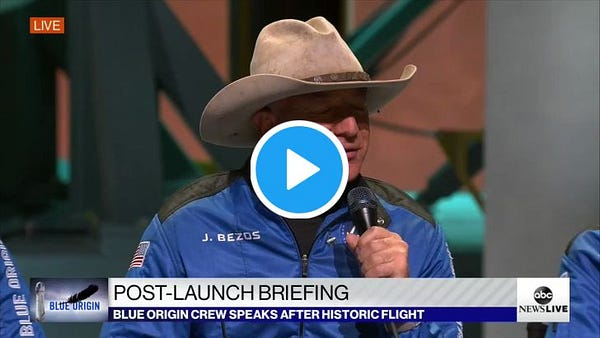
—
“criticise billionaires without sounding like a baby challenge via @vgr”

—
The dumbest part of our national discourse at this moment is:
Oh those crazy space billionaires!
How dumb are Bezos, Musk, Branson—spending $1 billion building rockets to fly themselves to space?
What a silly Gilded Age echo of ego, indulgence, not to mention tone-deafness.

—
“Going into Space - Francis Becenti, a Navajo, wrote this poem in 1971 when he was nineteen years old. Rising Voices: Writings of Young Native Americans” edited by Arlene Hirschfelder and Beverly R. Singer.”
—
“the great phil ochs also had a good song addressing depraved billionaires like branson, bezos and musk: "Spaceman, look down: Tell me what you see. Can you see the hunger there Strikes without a sound? Can you see the food you burn As you circle round?"“


—
“gil scott-heron's "whitey on the moon" perfectly encapsulates the deranged pathologies of billionaires like richard branson and jeff bezos


—
“Like many, the "billionaire space race" brought to mind Gil Scott-Heron's 1970 poem "Whitey On the Moon" which critiqued race-class dynamics in aftermath of Apollo 11's moon landing.
I cut this video as a meditation on Scott-Heron's words in light of current events. Enjoy”


—
“Bezos, Branson, Musk, and others have overtaken a wildly expensive, ineffective government program and built a competitive industry, driving down the cost of getting a kilogram into Low Earth Orbit by 44-fold already.”

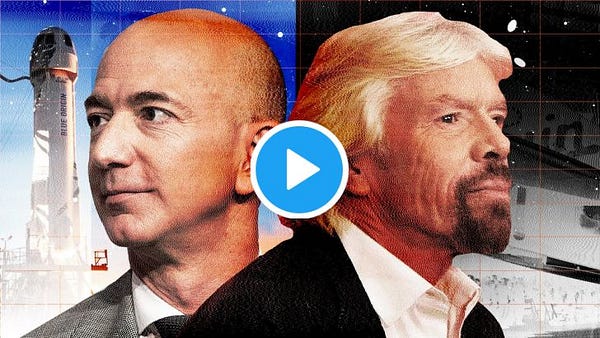
Videos
The (Slow) Crisis Of Space Junk via @PBSspacetime
“While recent news about the Chinese Long March 5 Rocket made a lot of people very nervous because a 22-ton rocket was going to fall out of the sky, this sort of thing happens all the time. Boosters, dead satellites, and sometimes even old space stations get dropped out of the sky fairly often. While the litter seems a little inconsiderate, this is probably far safer than the alternative. The accumulation of space junk poses a huge risk to all human operations in space especially if we cross the threshold into the chain reaction of exponentially growing collisions known as the Kessler Syndrome.
Check out all the Leo Labs Space Debris Tracker
https://platform.leolabs.space/visualizations/leo”
—
How To Terraform Venus (Quickly) via @Kurz_Gesagt
“Leaving earth to find new homes in space is an old dream of humanity and will sooner or later be necessary for our survival. The planet that gets the most attention is Mars, a small, toxic and energy poor planet that just about seems good enough for a colony of depressed humans huddled in underground cities.
But what if we think bigger? What if we take Venus, one of the most hostile and deadly places in the solar system and turn it into a colony? Not by building lofty cloud cities, but by creating a proper second earth? It might be easier than you think.”
—
The Physics of Space War via @AerospaceCorp
“What might a war in space look like? As the United States and the world discuss the possibility of conflict extending into space, it is important to have a general understanding of what is physically possible and practical. Read more in our space policy paper, The Physics of War in Space: How Orbital Dynamics Constrain Space-to-Space Engagements–https://aerospace.org/paper/physics-s...”
—
How the rich avoid paying taxes via @Maddie_Marshall @voxdotcom
“The richest in America don't make money like most Americans. Most people pay income taxes from a regular job. But many in the top 1% make money off their investments, like stocks, and pay capital gains taxes. While normal income has a maximum tax rate of 37%, long-term capital gains tops out at just 20%. Changing that rate, and some loopholes that benefit the wealthiest, is seen as one way to tax the rich.”
—
#1 - The Overview Effect YT Playlist:
Playlist based off original Substack newsletter here: https://eclecticspacewalk.substack.com/p/eclectic-spacewalk-1-the-overview
Website
How Long Does It Take Tech CEOs to Earn Your Salary?
“We ran the numbers, and as of 2019, fifteen of the most generously-compensated tech CEOs in the U.S. have a combined annual income of over 83 billion dollars. We calculated annual income from SEC filings by collecting the sum of each CEO’s base salary, annual cash bonuses, annual stock awards (or earnings from equity), and other forms of compensation.
For a true frame of reference for how much these billionaire CEOs actually earn, the SimpleTexting team has built a calculator where users can input their individual salaries and expenses to see how quickly moguls, like Jeff Bezos, Elon Musk, Mark Zuckerberg, and Susan Wojcicki, earn them or pay them off. Also, we highlight how much these CEOs earn per year, per day, per hour, and per minute.
To see where you stand, simply choose a CEO and expense type from the drop-down menu. Then, input either your annual salary, your total outstanding mortgage payment, or your total outstanding student loan debt to uncover how long it will take these high-profile tech CEOs to earn your salary or pay off your expenses.”
—
Pandemic Pay Plunder via @IPS_DC
Low-Wage Workers Lost Hours, Jobs, and Lives. Their Employers Bent the Rules — To Pump up CEO Paychecks.
“Topline: During the pandemic, more than half of the country’s 100 largest low-wage employers rigged pay rules to give CEOs 29 percent average raises while their frontline employees made 2 percent less.
Of the 100 S&P 500 firms with the lowest median worker wages, 51 bent their own rules in 2020 to pump up executive paychecks.
Common manipulations included lowering performance bars to help executives meet bonus targets, awarding special “retention” bonuses, excluding poor second-quarter results from evaluations, and replacing performance-based pay with time-based awards.
Among those 51 companies:
CEO compensation averaged $15.3 million, up 29 percent from 2019.
CEO-worker pay ratios averaged 830 to 1 in 2020.
Median worker pay ran $28,187 on average in 2020, 2 percent lower than in 2019.
Sixteen firms ended 2020 in the red. This group of profit-losing, rule-bending corporations had the highest average CEO pay, at $17.5 million.
Because women and people of color make up a large share of low-wage workers and a tiny share of corporate leaders, extreme CEO-worker pay divides increase gender and racial disparities.
Extreme pay divides also decrease organizational effectiveness. Decades of studies back up Treasury Secretary Janet Yellen’s 1990 “Fair Wage-Effort Theory” that large pay disparities undermine employee morale and productivity.”
Full Report: https://ips-dc.org/wp-content/uploads/2021/05/report-executive-excess-2021-PDF.pdf
—
NASA Spin-Off Technologies via @NASAspinoff
“Spinoff highlights NASA technologies that benefit life on Earth in the form of commercial products. We’ve profiled more than 2,000 spinoffs since 1976 — there’s more space in your life than you think!”
More on Eclectic Spacewalk:
Subscribe to Substack Newsletter
Listen to all podcasts on Anchor
Follow Eclectic Spacewalk on Twitter



